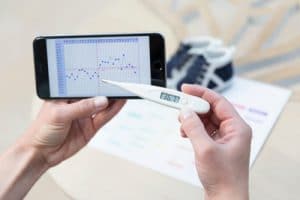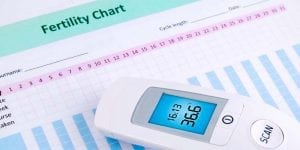Early ovulation occurs when your ovaries release an egg earlier in your cycle than they should. Causes include stress and many other factors. Read on for more!
Using ovulation tests and other similar methods to track your fertile window will teach you many things about your cycle. Most women typically ovulate on the 14th day of their cycle, with day one being the day they get their period.
Studies, however, show that very few women actually ovulate on the 14th day. A majority either ovulate earlier or much later in the cycle. As a result, there are instances where you may have had early ovulation. There are a few reasons for this.
Early Ovulation: What Are the Causes?
Early ovulation occurs when your ovaries release an egg earlier in your cycle than they should. In women of reproductive age, ovulation typically occurs between days 6 and 21 of their average cycle.

- Change in discharge
- Breast tenderness
- Change in basal body temperature
- Change in libido
So, what causes early ovulation?
Women experiencing high-stress levels in their bodies may have a hard time sustaining a regular cycle. The same holds true for those suffering from certain chronic conditions. Pituitary gland dysfunction and diminished ovary syndrome are examples of illnesses given by the Centers for Disease Control.
Aging is a part of life, and as you approach menopause, the chances are that your menstrual cycle will undergo some changes. Apart from becoming irregular, it may also become shorter, impacting early ovulation.
Traditionally, menopause begins when you have gone at least 12 months without a period. Perimenopausal symptoms, like a shorter cycle, may appear in your early to mid-30s.
Another reason why you may find yourself ovulating early is if you’re under or overweight. For example, overweight women have a higher probability of developing PCOS symptoms. These symptoms may also worsen with time.
Underweight women may develop hormonal imbalances that prevent their bodies from producing viable eggs. These hormonal imbalances can also lead to irregular menstrual cycles.
Your lifestyle choices can disrupt ovulation and impact fertility. Common factors known to cause this include irregular sleeping patterns, high-stress levels, tobacco, substance abuse and diet choices.
Ensuring you have a healthy mind and body is a significant step towards regulating your menstrual cycle.
Is It a Bad Sign If You Ovulate Early?
Ovulating early isn’t necessarily a bad sign, even if you’re used to experiencing a regular cycle. There’s no guarantee that you’ll ovulate on the same day each month, which is why you need to use ovulation tests if you’re trying to get pregnant.
Timing your fertility window can prove even more problematic if you have an irregular cycle.
Early Ovulation and Infertility
Early ovulation doesn’t mean that you can’t get pregnant. However, medical experts recommend you look into the issue instead of overlooking it. Ovulating before day 11 can make it hard to get pregnant as the egg will not have matured and developed inside a follicle.
Remember, this has to happen for it to become fertilized and develop into an embryo.
Additionally, a relationship between women with short follicular phases and stillbirths may exist. According to a study by J Women’s Health, most women who have experienced a miscarriage in the past had a short follicular phase.
Does Ovulating Early Impact My Ability to Get Pregnant?
Not necessarily. Several studies have shown different results, implying that your ability to have a child mainly depends on why you’re ovulating early. You may want to track your cycle for a few months to establish the causes.
Note your findings and carry the data with you on your next visit to an OBGYN.
Is It Possible to Fix a Short Follicular Phase?
It’s likely that you have already read about all types of “natural fixes” online. The reality is that there’s no proof that these fixes, e.g., acupuncture, herbs and raw seeds, will assist in lengthening your follicular phase.
The best and most practical approach to understanding the reasons for your early ovulation is to consult an OBGYN. They will use any data you may provide to get down to the root cause of the problem before prescribing some medication to fix the issues.




